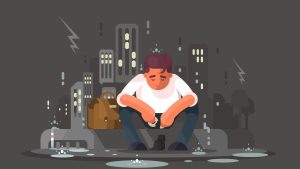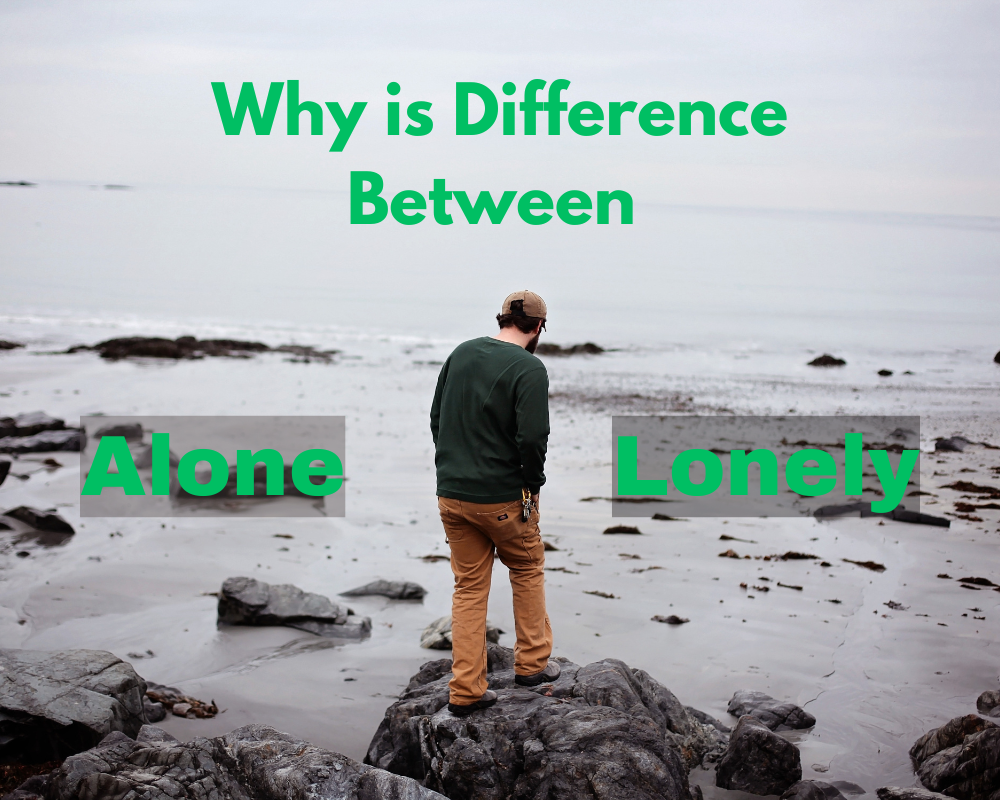Alone and Lonely: Let us not forget the difference between lonely and alone, even though they seem to have similar meanings. There are people who have a tendency to feel lonely, while others are content living alone. contentment or a lack thereof is reflected in this. Modern people are more lonely than ever despite all their gadgets and money. Just a century ago, people were much more social and active when they had no entertainment options (not even radio or television). We surf the cable channels without purpose, while our parents enjoyed watching just a few channels. Money and gadgets may have made our lives easier, but that doesn’t mean they made us happier.
What Is Loneliness?

When someone lacks meaningful relationships, they experience loneliness. No matter their age or social standing, anyone is susceptible to feeling this type of emotion – often associated with feelings like isolation and feeling out of place.
Loneliness can be perceived in several ways; unlike alone which has no connotations. If someone feels lonely they don’t necessarily need to be isolated in order to experience that emotion; even within large crowds someone could still feel sad and isolated due to missing loved ones; synonyms include abandoned, isolated desolate lonesome.
For example:
- After her husband passed, Tara is feeling alone and grieves over his absence.
- He felt homesick abroad without his family and friends nearby to provide comfort.
- She felt betrayed after discovering his affair.
- Even though Mark lived alone, he never felt lonely due to having numerous close connections.
- She found herself feeling abandoned since the kids had left.
What Does Being Alone Mean?

To exist alone is simply being, without emotional attachment to others or any particular purpose in mind; many find being alone a relaxing and peaceful experience.
Being alone can be defined simply as when there is no companion to keep company, one could consider themselves alone and may see no reason for worry in being so. Being on one’s own or solo does not have any negative connotations attached.
Example:
- Sally was sitting alone on a park bench reading her paper.
- John enjoys traveling alone.
- Peter had left his dog alone in the apartment.
- Mary was responsible for raising three children by herself without assistance from others.
- As soon as our father left, just my sister and I were left behind in his absence.
The Link Between Alone and Lonely
While feeling alone and being lonely are often used interchangeably, they do differ considerably. Loneliness is an emotion; feeling alone is simply a state of mind – meaning you could experience feeling isolated without necessarily experiencing being lonely.
Difference – Alone vs lonely?
Let’s compare aloneness and loneliness: aloneness refers to being free from other people; while loneliness, on the other hand, is associated with emotional feelings of isolation or abandonment; being alone doesn’t automatically equal feeling lonely – indeed you could even feel this way when surrounded by people!
“Loneliness and isolation” can refer to both people and objects.
Alone vs lonely – why is the difference?
- To understand whether elderly people feel alone or lonely is to observe their current state. In years gone by, elders were seen as sources of wisdom and experience who provided comforting presences within homes – their advice often sought by children for advice or comfort from older family members; now with internet connections as resources, they no longer require their advice as much. Gradually as their status decreased senior citizens began feeling increasingly lonely despite living among loved ones such as children or family. When seniors realized they weren’t liked or respected anymore then loneliness set in.
- Contrary to popular opinion, today’s youth are also feeling isolation. Kids these days spend too much time watching television or online instead of with real people they meet face-to-face – this makes children far more alone and insecure than before, who had lots of energy and enjoyed spending time socializing. Feeling isolated has become part of everyday life for these youngsters who’ve made a deliberate choice to live alone rather than among peers.
- As time progresses, our quality of interactions declines, which results in withdrawal symptoms. People who avoid contact altogether in favor of engaging with people online or watching television are signs that their interactions have diminished over time and that loneliness exists within.
- Creativity and engaging in rewarding activities will prevent one from feeling isolated; otherwise, they risk becoming depressed and lonely even though surrounded by other people.
Reasons For Loneliness
There can be various causes for loneliness; such as:
- Social Isolation
Beginning a job or moving to a different location can create feelings of social isolation. - Breakup or relationship troubles?
- Disability or health conditions
- Life-altering events
Effects of Loneliness
Loneliness can have lasting repercussions on one’s physical and psychological well-being, including mental anguish and distress. Loneliness may result in multiple manifestations – these may include;
- Increased anxiety and depression risk
- Stress levels are higher; poor sleep quality hinders restful slumber; heart disease risks increase, risk increases
- Lower cognitive functionality.
- How to Overcome Loneliness by Overcoming Depression
How to Overcome Loneliness
Overcoming loneliness is possible. Some strategies you could try include:
- Building meaningful connections.
- Join clubs or organizations which correspond with your passions.
- Giving back or volunteering within their communities are great ways of giving something back.
- Should additional assistance be necessary, seek professional help as necessary.
Benefits of Being Alone
- Being Alone Has Benefits Although loneliness may have negative ramifications on health, being alone does have many positive attributes that you could leverage from.
- Creativity Increases, Focus and Productivity Increase.
- Self-reflection can provide an opportunity for personal growth.
- Stress Relief/ The Right to Pursue Interests
How to Enjoy Being Alone
There are various strategies you can employ in order to make the most out of being on your own and here are a few suggestions on how to enjoy being alone:
- Reward yourself by reading, listening to music, or engaging in other enjoyable activities.
- Discover and develop new talents or hobbies today
- Relax by enjoying a bath, yoga session, or outdoor walk in nature.
- Journal or meditate
Finding Balance
- Achieving optimal well-being involves striking an equilibrium between being alone and being connected with others. Meaningful relationships must exist while giving oneself time alone – both are crucial parts of maintaining overall well-being.
- Setting boundaries and prioritizing self-care are effective ways of striking a balance. Say no when you need time alone or take a social media break as necessary – both strategies will allow for the pursuit of balance. Recognizing and responding to loneliness will further promote harmony within any relationship.
- Connecting with others and building community are effective strategies for finding balance. Joining clubs or organizations aligned with your interests or volunteering at an admirable cause are ways of finding balance. You should form meaningful relationships that bring joy.
- Finding balance can be a difficult journey that takes careful reflection and consideration of both yourself and what suits your lifestyle best. Prioritize well-being over convenience – find what works for you best!
Conclusion
Being alone and being lonely aren’t interchangeable concepts, yet these terms are sometimes confused. While being lonely doesn’t necessitate isolation, its negative health implications should still be taken seriously. Therefore it is key that individuals find a healthy balance between solitude and social engagement, prioritizing self-care while building meaningful relationships in order to experience increased fulfillment and well-being through these strategies.

